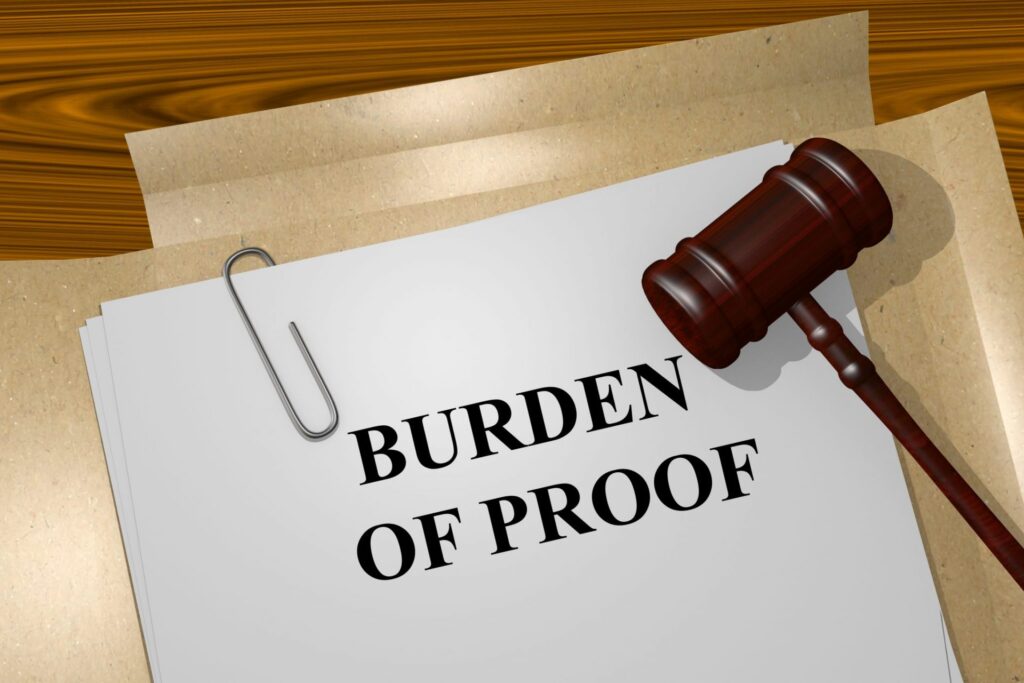The world of the law can be a fascinating and complex place. There are plenty of words and phrases – “terms of art” – that can make it difficult for non-lawyers or those without a legal background to understand what’s going on. Phrases like “due process,” “res ipsa loquitor,” and “reasonable suspicion” are just a few of these confusing terms.
However, even words or phrases that seem normal can have a deeper meaning in the legal field that some people are not aware of. One of these, the phrase “burden of proof,” also comes with serious implications that are important to understand, if you are making a journey through the U.S. legal system.
What Is a Burden of Proof?
In an argument – any argument, not just a case or trial in a courtroom – one side is going to have the responsibility to show that what they’re saying is correct. This responsibility is the burden of proof. If that side succeeds in showing that they’re right, then they will have met their burden of proof, and win the argument.
The important thing to remember about the burden of proof is that it’s an important responsibility. The side that does not have the burden of proof can simply sit back and listen and still win the argument if the side with the burden doesn’t come through.
An Example of the Power of a Burden of Proof
A good example of the power of the burden of proof comes from an analogy by Bertrand Russell. To show why people who make claims that are impossible to prove or disprove should always have the burden of proof, Russell claimed that there was a teapot, orbiting the Sun somewhere between the Earth and Mars.
This thought experiment might seem strange, but it brings out the power of having or not having the burden of proof: If the burden of proof were not on Russell to prove that the teapot was there, then it would lie on someone else to prove that the teapot was not there in order to win the argument. This might be impossible to do, or at the very least take much more work.
The Burden of Proof in Criminal Cases in Maine
The burden of proof is a big part of the legal system in the U.S. and in Maine. In criminal cases, it is the prosecution that has the burden of proof to meet. That is why they present their case first in a trial. If they do not meet their burden of proof on an essential element of the crime you are being charged with, then your defense attorney can merely point this out and the trial can end. However, in other aspects of a criminal case – such as a motion to exclude evidence – the defense will have the burden of proof. In some situations, the burden of proof can even shift from one side to the other.
Of course, we deal in reality and not the theory of the practice of law, which is reserved for the Ivory Tower law school professors. The reality is that the jury already thinks you’re guilty because you’re sitting at the defense table and the court has informed the jury of the charges. The reality is that you have to prove to the jury that you’re innocent, which, oftentimes, is an impossibly high burden. Now, the law says the prosecution has to prove you committed the crime by proof beyond a reasonable doubt. However, the reality is that your attorney has to prove to the jury you’re innocent because most people can’t set aside their first impressions and prejudices in order to follow the law. Having an experienced trial attorney on your side is the key to a successful outcome.
Maine Criminal Defense Attorney William T. Bly
William T. Bly is an experienced criminal defense attorney in the state of Maine. With his knowledge of the law and how crimes are investigated, he can provide you with the staunch legal defense that you need to beat a criminal charge. Call his law office at (207) 571-8146 or contact him online.


